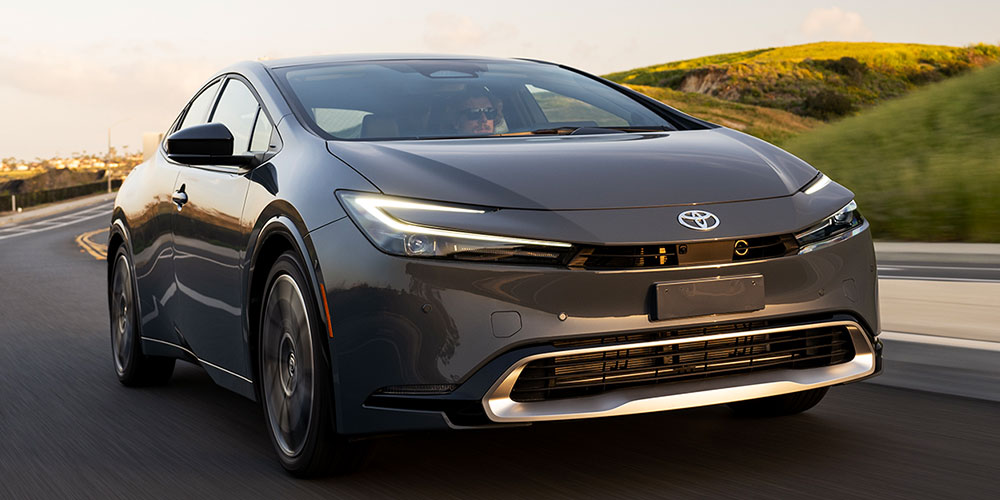
[ad_1]
Gas-electric hybrid cars fill a need for those who want an electric car but don’t want to experience range anxiety. Since these vehicles have dual drive trains, one electric and the other gas, they are more complex than all-electric or all-gas-powered cars.
When driven correctly, mainly on electric power, the less-reliable gas system is seldom used, which lowers wear and tear on those components. However, infrequent use of the gas system can lead to issues with ethanol, especially if drivers don’t replace the gas regularly, as it can gel and clog the fuel delivery system.
I currently have a Volvo XC60 recharge plug-in hybrid. I found that to get the maximum use of electric power, you’ll want a minimum range greater than 30 miles, and the closer you get to 100 miles, the less likely you have to use the gas engine. Currently, fully electric cars are best as second cars, while gas or plug-in hybrids are fine as primary or secondary cars.
Let’s talk about plug-in hybrid cars this week, and we’ll close with my Product of the Week: The Black Diamond gaming keyboard, which I’ve been using since December and simply love — which is good as it wasn’t a cheap date.
Understanding Hybrid Car Technology
Hybrid cars come in several forms. Initially, the most common were cars that used the secondary electric system for peak performance so they could use smaller engines that were more fuel efficient. These are mostly gone now, and you only see this approach used in supercars and the new Corvette E-Ray, which are less about economy and more about pure performance.
Current hydrogen-powered cars are effectively hybrids because they use hydrogen to power a generator that charges the batteries. On paper, if they had a fueling ecosystem that was large enough (they don’t), they’d be better than pure electric cars because their waste is pure water, and they don’t have the range issues of a pure electric car.
Home hydrogen generators are available, but they are pricey at over $10,000 compared to a home Level 2 electric car charger that costs under a grand, and some are closer to $200. So, until the fueling problem is fixed, this is a very niche class.
Plug-in hybrid cars are the most common, typically consisting of a gas engine and electric motors in the same vehicle. While there were electric cars like the BMW i3 that had gas-powered range extenders, these are mostly gone now as most didn’t want to lose their luggage capacity for a stand-alone generator that could recharge the battery in the car.
Some cars have both motors linked within the same drivetrain, while others, like my Volvo, feature a design where the gas engine drives one pair of wheels — typically the front set — and the electric motor powers the other pair.
This class of vehicles sports long ranges compared to pure electrics, and they can have ranges that extend beyond pure gas cars, as they are often gas cars with a secondary electric power system, which grants extra range. I’ll focus on ranking this class.
Because they have far smaller batteries, fully charging them at home typically takes less than 10 hours or overnight, while a full recharge on an electric-only car at home can take longer.
Polestar 1

(Image Credit: Polestar)
Arguably, the best plug-in hybrid car is the Polestar 1 mainly because of its massive (for a plug-in hybrid) electric range of 52 EPA miles in pure electric mode, with Polestar saying it can reach up to 77 miles.
It isn’t inexpensive at $150,000, but it is the closest thing in this class to a no-compromise plug-in hybrid electric. This car is more of a large GT, a practical sports car. It’s stunning to look at, and for the price, it’s exclusive.
For a hybrid, the performance is notably strong despite these cars tending to be heavy. It delivers around 600 horsepower, a whopping 738 pound-feet of torque, and a 0 to 60 of 4.3 seconds. The gas engine has a supercharger to avoid turbo lag and a turbocharger that provides extra boost at higher RPMs.
This was the first of the Polestar models, and it looks and feels more like a show car than a production car in how advanced it looks and feels. If budget were no object, this would be the car I’d pick. This car is rolling art. There are a couple of them in my area, and they look even better in person than in the pictures.
Range Rover Sport Autobiography

(Image Credit: Jaguar Land Rover)
While Jaguar Land Rover (JLR) is struggling with its conversion to an all-electric product line due out next year, the Range Rover Sport Autobiography is one of the top-performing, more affordable hybrid electrics on the market.
At over $120,000, this isn’t a huge improvement over the Polestar 1 and again highlights that if you want no compromises, you’ll pay a premium price. However, JLR is having a tough year, so it might be more willing to negotiate a lower price. At 543 horsepower, this car isn’t as powerful as the Polestar, but it is an SUV, so it is more practical than a GT.
With a certified range of 51 miles, a 0 to 60 of 4.7 seconds, decent luggage space, and carrying capacity, this vehicle would be ideal for those who want the style and look of a Range Rover but want the electric capabilities of a plug-in hybrid.
This model is a decent, good-looking truck with the off-road capabilities of a Range Rover. Still, the price is steep for most buyers, and concerns about whether JLR will survive its electric pivot are worth considering.
BMW X5 xDrive50e

(Image Credit: BMW Group)
After the prior two cars, the $73,000 BMW X5 xDrive50e looks like a bargain. It has decent horsepower and torque with 483 horses and a 4.6-second sprint from 0 to 60. I don’t think this vehicle is as attractive as the Range Rover or Polestar, but it may be more practical given its storage capacity and far lower price.
The xDrive50e should also be good in inclement weather, and it’s a BMW, so handling should be impressive if a little stiff. While it isn’t a bad-looking car, it doesn’t yet have the massive grill of some of the latest BMWs. It also doesn’t really stand out, which may be good because folks with expensive cars can often become targets for thieves.
BMW doesn’t appear to be in financial distress, nor is it a new company, suggesting it’ll be around to service the car once you’ve purchased it. Plus, with a more extensive dealer network than Polestar or JLR, your service experience should be easier than with the other two cars.
Volvo XC60 Recharge

(Image Credit: Volvo Car Group)
We drive the Volvo XC60, a 2021 model. When I told my wife we were going to get a Volvo, she implied that would happen over her dead body because she didn’t want to be seen in a boxy Volvo. However, after seeing and driving the car, she wanted it. While our car has only 20 miles of electric range, current versions have around twice that, making me wish I’d waited a year and bought the newer model.
This car has been great with our pets, and in the massive snowdrop a few weeks ago, it was like a tractor with only a little slipping, thanks in part to the snow tires we have on it. The towing capacity of roughly 3,000 lbs. is on the lighter side, but that doesn’t detract from its overall capabilities. This 455 horsepower SUV will do 0 to 60 in 5.9 seconds, and prices start in the low $40,000 range. Ours cost closer to $65,000 fully configured.
We bought ours three years ago, and the car has been trouble-free. This Volvo has been great for both short hops and long driving trips, boasting a total range of over 500 miles. It is a true bargain on this list.
Toyota Prius Prime

(Image Credit: Toyota)
Toyota Prius models are often the go-to car for Uber and Lyft drivers. While I personally don’t like these cars, it is hard to argue that Prius isn’t an amazing hybrid line.
The Prius Prime with plug-in capability leads on pure value. There are three models (SE/XSE/XSE Premium), which range in base MSRP from $32,975 to $39,670. This is not a performance car by any stretch of the imagination. With a 0 to 60 time of 6.6 seconds, it’s one of the slower plug-in hybrid cars on the market.
Building on the legacy of the Prius line, the Prius Prime has set a high standard in the plug-in hybrid segment. With an EPA-estimated all-electric driving range of up to 44 miles, they are still one of the most practical plug-in hybrids on the market, though not my cup of tea, as I prefer more performance in my vehicles.
The Prius Prime is the greatest value on my list, but it’s best for those who want gas mileage and are likely to drive the wheels off their car.
Related: The 5 Best Electric Cars on the Market | Jan. 8, 2024
Wrapping Up
For our situation, where every place we drive to is under 10 miles away, a plug-in hybrid is generally better as a primary car than an electric or pure gas automobile. This is because we have a large solar plant on our home; we basically drive the car for free and go through about three tanks of gas a year — which keeps us from having the ethanol problem of gelled old gas.
If we had the newer version of our Volvo, we’d be buying non-ethanol gas to address that problem and drop our gas usage by at least one tank a year.
Plug-in hybrids are an excellent option for those who want the experience of an electric car but don’t want to experience the pain of the public charging network and need more range than electrics currently offer. They are a terrific way to lower your carbon footprint and experience at-home charging while the country continues to build out its electric charging network.
These are transitory cars in that they’ll exit the market a few years after gas cars do, but that is unlikely to happen for the next five years, making current purchases relatively safe.

Black Diamond 75 Gaming Keyboard Advanced Edition
I like mechanical keyboards. Yes, they make a little more noise, but I write a lot, and the feel of the keyboard makes an enormous difference to me. The Black Diamond 75 keyboard looks and feels wonderful.

(Image Credit: Dry Studio)
It’s heavy and has a clear top so that you can see some of the internals. Thanks to the weight of the keyboard, it also has a very luxurious look and feel that I love. As mechanical keyboards go, this one is comparatively quiet as Black Diamond implemented an impressive amount of sound deadening, but it still clicks.
The configuration I have has a lot of carbon fiber and backlighting and has worked flawlessly for the months I’ve been using it. The inspiration for this keyboard was the Lamborghini Aventador, and it shows in the product. I can’t afford the Lamborghini, but I could afford this expensive $295 keyboard.
This Black Diamond keyboard supports Bluetooth connectivity and can be charged wirelessly, provided you have a charging mat. I keep mine plugged into the PC even though it has 75 days of battery life.
If you write or game, it is great to have a genuinely high-quality tool to use. It’s like typing on a piece of art that can take abuse. It still looks new after the two months I’ve used it. It is hard to believe I’d fall in love with a keyboard, but I have.
I love this thing, so the Black Diamond 75 gaming keyboard is my Product of the Week. It brings a smile to my face every time I sit at my desk and start typing. It’s AWESOME! I only wish they made a matching mouse.
[ad_2]
Source link






